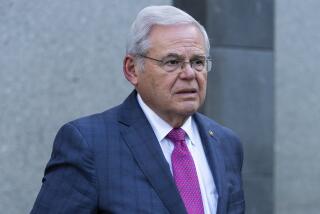Jurors in Exec Life Case Take Their Time
- Share via
Even after sitting through eight weeks of complex testimony -- some of it in French -- the jury in the Executive Life Insurance Co. trial has been in no hurry to go home.
Defying some early predictions of a quick verdict in the civil case, which pits state Insurance Commissioner John Garamendi against one of the richest men in France, the jury has been deliberating since April 18 and has given little indication that a decision is imminent.
In what could be a sign that judicial patience may be getting a bit strained, U.S. District Judge A. Howard Matz told the jury to have its lunch Thursday at the courthouse -- breaking the panel’s daily routine of eating out at nearby restaurants in downtown Los Angeles.
Matz’s clerk wouldn’t comment on the reasons for the judge’s request, although he said he wouldn’t describe it as unusual. After all, the clerk said, it was raining Thursday -- good weather for dining in.
But the judge, who is slated to start another trial next week, has indicated in recent comments that he’d like to see the jurors stay more focused on their task.
“This is not an open-ended process that has no impact on others,” Matz said during meeting with lawyers earlier in the week. And the jury, it was noted, also didn’t go out for lunch Friday -- when the weather was considerably sunnier.
The verdict in the Executive Life case could come as soon as Monday. But there are signs that the jury may be prepared for a longer haul: One juror reminded the judge in a note Tuesday that he had a vacation scheduled for late next week and asked for Wednesday through Friday off.
Los Angeles lawyers who know Matz said the judge’s concern about the jury’s lunchtime routine made sense.
“When it comes to helping a jury move along, he’s someone who knows what he’s doing,” said Brian Hennigan, a former federal prosecutor who specializes in white-collar criminal defense work at law firm Irell & Manella.
Considering the length of the trial, Hennigan said, the amount of time the Executive Life jury has spent weighing the evidence “doesn’t seem especially long -- yet.”
And the lawyers in the case, some of whom were privately speculating early on that the jury would stay out less than a day, are keeping a stiff upper lip.
“We’re all encouraged at how seriously the jury is taking this, and anything that speeds up the process is a good thing,” said James Clark, who is representing French billionaire Francois Pinault, the only major defendant remaining in the case, which was filed in 1998.
The Executive Life trial included more than 40 witnesses -- some of whom testified in French, requiring the services of an interpreter -- and more than 1,800 exhibits, some of which related to complicated junk-bond transactions. Since it began deliberations, the jury has sent out notes requesting more information, such as transcripts of testimony and questions about issues in the case.
Federal officials said they could not track the longest amount of time a civil jury has taken to deliberate. Typically, the lengthiest deliberations are in criminal trials, where someone is facing life in prison or a death sentence.
Last August, in one of the longest civil case deliberations in recent history, a federal court jury in Long Beach spent 18 weeks deciding to award a mother and her son $22.5 million in a land-use dispute with the city. The trial had lasted six months.
In the Executive Life suit, the state is seeking $1 billion in damages and interest from Pinault. The state alleges that Pinault was involved in conspiracy with French banking giant Credit Lyonnais and others to reap billions in illegal profits from the 1991 collapse of Executive Life -- at the time the largest insurer in California. During his testimony, Pinault denied any wrongdoing.
More to Read
Sign up for Essential California
The most important California stories and recommendations in your inbox every morning.
You may occasionally receive promotional content from the Los Angeles Times.













